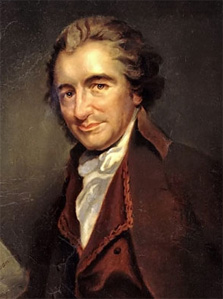| Profile | Major Works | Resources |
Thomas Paine, 1737-1809

English political philosopher and pamphleteer.
Thomas Paine, an English Quaker and bankrupt corset-maker, emigrated to America in 1774, when he was 37. Armed with a letter of introduction from Benjamin Franklin, Paine soon set himself up as a journalist in Philadelphia. Although he was not very long in American colonies, Paine quickly gained a sense of the mood, particularly from one of his Philadelphia hosts, Benjamin Rush. Paine was one of the founding members of the Pennsylvania Abolitionist Society in 1775.
Swept up by the cause of the American Revolution, Thomas Paine published his classic pamphlet, Common Sense, in January 1776, to explain the case for independence to the American people. In plain language, Paine describes the natural law theory of governments, and the origins of law as a contract, but that there is no place for a king or aristocracy, who will always corrupt the system into tyranny. Paine does not accept Locke's constitutional monarchy idea, nor Montesquieu's notion of checks and balances to democratic will. Paine uses Biblical imagery to restate equality of men in creation, without aristocracy. He then proceeds to discuss the American case, saying that being ruled by Britain makes no sense (distance, mistreatment, ethnic mix of peoples, religious reasons, etc.). Independence is the best choice, Tom Paine declares, and presents an outline of a possible democratic governmental system for an independent United States. First printed anonymously in Philadelphia, the pamphlet is an instant success and helps win over much of the common people (most of whom, unlike elites, were still on the fence) over to the cause of independence. It was Paine who really changed the dialogue from being one about English constitutional rights, and negotiating a new "constitutional" basis for the relationship between America and Britain, to one of thinking about outright independence (particularly after Lexington).
Accompanying Washington's army, Paine wrote his stirring American Crisis in December 1776, at the nadir of American fortunes ("These are the times which try men's souls...."). Washington had it read to the troops to inspire morale. He would continued putting out additional pamphlets under that title until 1783.
Paine returned to Europe in 1787. Paine soon moved to France to observe (and eventually participate) in the events of the revolution. Paine's famous 1791 book, Rights of Man (published in two parts, in May 1791 and February 1792) was a defense of the French Revolution directed against critics, specificallly Edmund Burke. The second part got Paine tried for seditious libel and outlawed in England. Paine had already moved to France, where he became an honorary French citizen and a member of the National Convention in September 1792. Paine and other Enlightenment luminaries, like his fellow delegate and close friend, the Marquis of Condorcet, were appointed together to a committee to draft a constitution for the new French Republic. But by the time the document was ready in the early Spring of 1793, political events had changed and the radical Jacobins, on the ascendant, were no longer interested in the elaborately-constructed constitution of the savants, and set it aside. When the moderate Girondists were finally purged in mid-1793, Paine was thrown temporarily in jail. This is when Paine began working on his controversial tract on religion, Age of Reason.
Thomas Paine returned to the United States in 1802, but despised for his religious views, Paine died a pauper and outcast.
|
Major Works of Thomas Paine
|
|
HET
|
|
Resources on Thomas Paine Contemporary
Later
|
All rights reserved, Gonçalo L. Fonseca
